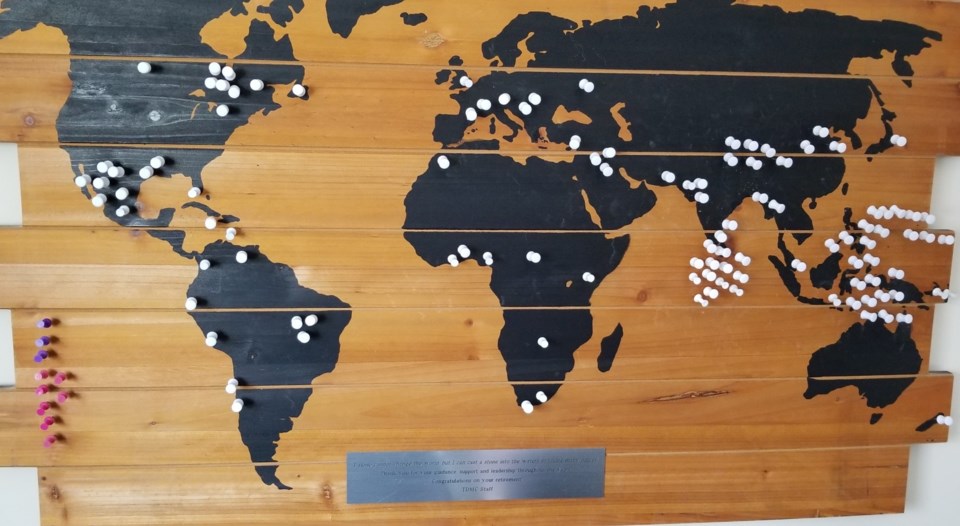Immigration accounts for almost 100 per cent of Canada’s labour growth, and 75 per cent of our population growth.
You might think our numbers would be down for 2021 due to the pandemic, but it was a record year for immigration, with more than 401,000 new permanent residents, beating a record that has stood since 1913. Of the more than 401,000, 62 per cent were economic class immigrants.
While Northern Ontario is not a major immigrant destination, at least not yet, statistics released recently by the Rural and Northern Immigration Pilot cities showed strong numbers for 2021.
See: Rural and Northern Immigration pilot project sees 21 new immigrants settling in this area
It was a good year for my immigration practice as well, now only in its third year. My wall map with pushpins showing the home countries of my clients gives me a quick look at numbers and countries. The blob on the right of the map represents the Philippines, my top source country, with 27 clients to date.
Most have either received permanent residence already or are in the federal government processing queue and should have their PR this year. The pins on the map represent only the principal applicants, not the members of their families.
The next largest concentration is India, with 15 clients. Then you can see it is Mexico with seven, Nepal with six, Pakistan with four, China and Brazil with three each, and then a scattering through the Caribbean, South America, Africa, Europe, the Middle East, Bangladesh, Japan, Singapore and New Zealand.
They are not all PR applications, as there are visitor visas and work permits in the mix as well, and they are not all intent on coming to North Bay, though most are. The 10 pins on the lower left represent 10 principal applicants that acquired permanent residence status, with many more in the queue.
The federal government has bumped its target again for 2022, up from 401,000 last year to 411,000 for 2022 and 421,000 for 2023. The ambitious targets caused a lot of frustration with processing times in 2021, but a news release January 31 from Immigration, Refugees and Citizenship Canada points out all the processing changes coming for 2022 or already in effect.
“I know that processing delays have been incredibly frustrating for many individuals,” Minister Sean Fraser is quoted as saying in the news release. I know from personal experience that the frustrating delays have been for visitor visas among my clients, while processing times for permanent residence through RNIP and spousal sponsorships have been well within the 12-month processing targets.
To achieve the goal of more predictable processing times IRCC is throwing money and technology at the backlog. There is $85 million for more staff, with a goal of returning to normal processing times by the end of 2022. This includes not only PR applications, but study permits, work permits, PR card renewals, visitor visas and proof of citizenship applications.
Already 500 new staff members have been hired and new online portals have been added to move away from paper-based applications in a number of programs. IRCC now moves files to its offices around the world to avoid over-burdening one location.
In 2021 more than 500,000 decisions on PR applications were made and the goal for the first quarter of 2022 is 147,000.
Canadian citizenship applications have moved to online testing and virtual citizenship ceremonies, which will be continued and expanded.
Almost 560,000 study permits were granted in 2021. We are seeing evidence of that with Canadore College’s international student numbers and there are signs that Nipissing University will up its game as well.
Many students see a pathway to permanent residence by coming to Canada as a student, acquiring a Post-Graduation Work Permit, and acquiring Canadian work experience. They form the bulk of my client base and I can tell you from meeting and working with them that they will be model permanent residents, and hopefully, soon after, Canadian citizens.
Don Curry is a Regulated Canadian Immigration Consultant living in North Bay. He is a member of Bay Today’s community advisory committee.



